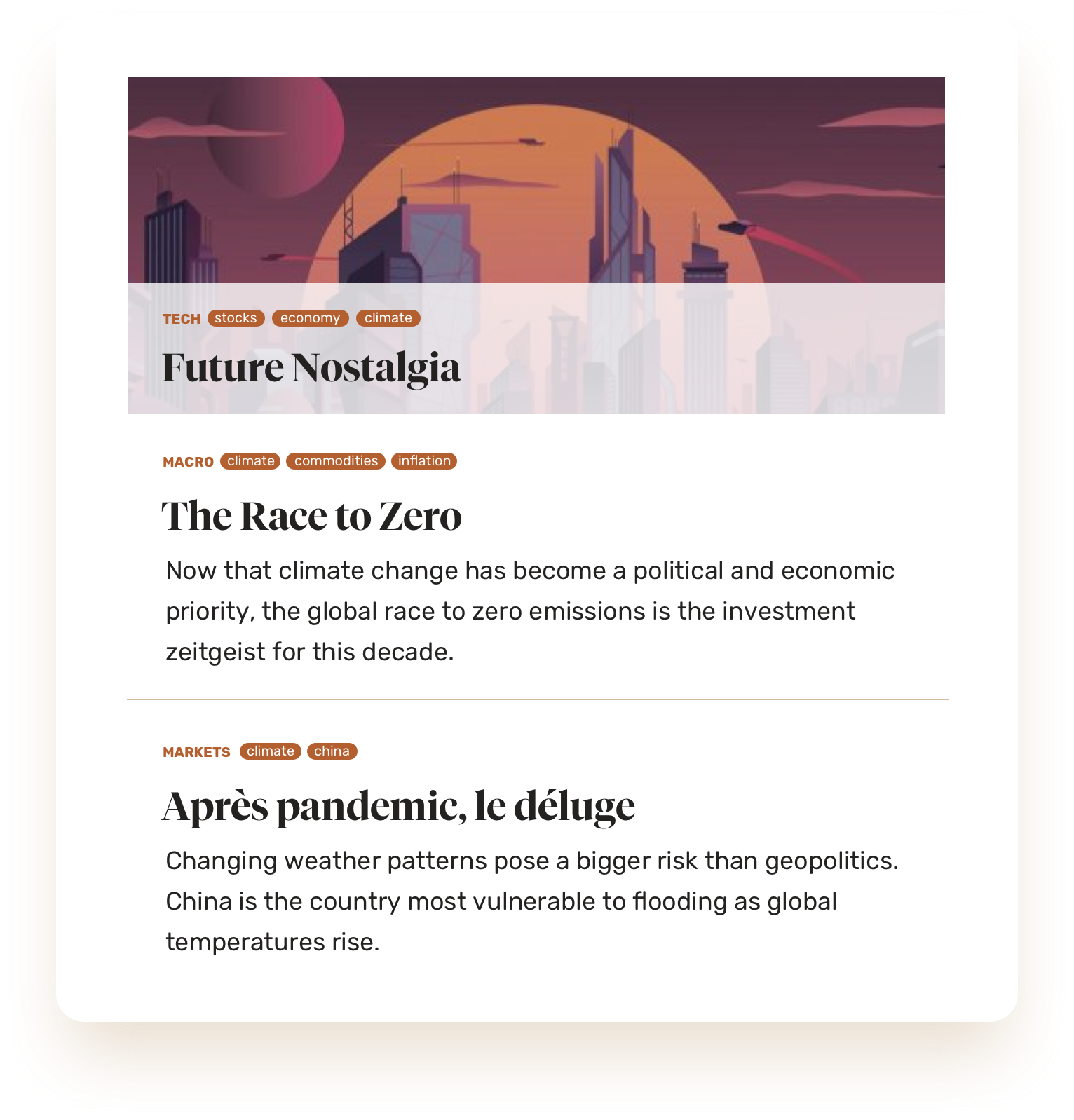China’s economic and investment landscape is undergoing dramatic change. There’s a big disconnect between what’s happening on the ground and what we read in the financial press. We dug into the real story behind China’s tech crackdown and the latest policy moves with Trivium partner Andrew Polk.
Here’s a pared-down version of our salon. You can watch the full conversation here.
On understanding Chinese policymaking
You should not be surprised by Chinese policy decisions because the process is extremely rigid and quite predictable. A meeting is held by an important body like the Politburo, then four to six months later the State Council will pick up the issue and provide high-level guidelines, which are tasked out to various ministries. Three months later, the ministries come back with their plans and the localities go on from there to implement. It does take discipline to closely watch and follow all those timelines and meetings.
Many people say China is a black box, but it is more of a gray box where you can see a lot of things. The problem is not that there is too little information coming out of China, but that there’s too much information coming out of China. Our issue is filtering out the signal from the noise.
As the intelligence community says, Chinese is the first level of encryption. Most people just don’t read or they’re not able to read. If you can get into the native language and pay close attention, you can have a good sense of what’s going on.
On Xi Jingping’s swagger
The key message to focus on from the party’s centenary celebrations is swagger. The party has been around for a hundred years, and they want to stay around for another hundred years.
There’s been this idea in the West that if China didn’t move closer towards a Western democracy, it would buckle under its own weight of the contradiction between an authoritarian regime and a fairly liberalized economic system. The party has obviously moved in a different direction and is now more convinced than ever that its system is a viable alternative to what the West offers.
Senior Chinese leaders lost faith in Western economic systems after the Global Financial Crisis. They thought that if the US economic system can come close to blowing up the entire global economy, maybe it’s not so great after all. That’s when they decided we should move away from the dollar.
And over the past year, they lost faith in the governance systems of Western democracies because of the way they handled the pandemic. So, they have a swagger and belief that they’re really on the right direction of travel.
On creating a modern socialist society
China has reached the end of a twenty-year project to create a “moderately prosperous society.” Now, they are shifting towards creating a “modern socialist society.” They have not defined what that is, but it is centered upon economic equality.
There is going to be a huge shift, which can already be seen at a high level in policy discussions from the growth at all cost model, to quality-of-life issues, and more balanced economic growth. When regulators talk about the recent tech crackdown that is happening, they point to economic inequality. They do not want tech companies and their employees becoming significantly wealthy while they have many people still near the poverty line. This shows how serious they are about the tech crackdown and that it is not going away any time soon.
The Chinese leaders are addressing the issues around inequality such as quality of life, pollution, and food security. These are the things that are going to keep them in power for the next one hundred years.
On risks associated with US-China relations
From a macro standpoint, the US and China tensions are not a driver of markets in the way that they were under the Trump administration. The US has shifted its stance away from trade in favor of sanctions as a sophisticated and appropriate tool for its relations with China. What China is doing to Australia is essentially a test of what they plan on doing to the West.
China has also come out with the anti-sanctions law where they have been explicit about building a legal toolkit to combat the US sanctions regime. It is very clear that at some point, a very large company is going to be put in the position where they are either breaking Chinese law or US law, and there’s no way out of it. Markets are going to notice when that happens.
On the reality of conscious uncoupling
It depends on the industry. There is a splintering on the tech side where US tech companies are less and less welcome in China, and the same with Chinese tech companies in the US. Europe is a bit of a battleground still.
There are two observations on the splintering or decoupling of the past couple years.
(1) No foreign company operating in China wants to decouple and leave China. There is a big disconnect between what US policymakers are saying and what companies are saying. Most companies will not move their operations unless they are legally forced to. Chinese companies do not want to decouple either.
(2) The reality of US lawmaking and regulatory action is very far from the rhetoric. The rhetoric may be to bring back companies to the US, but there is no action taken or incentives created to see that through. From this standpoint, the decoupling is a lot of talk and no action at this point. The caveat is the data piece, which is where there is currently some action.
On the geopolitics of Taiwan
The only way the Taiwan issue gets resolved is through reunification. But in the short-term, China will not forcibly takeover Taiwan. The US joint chiefs of staff know this, and they have made it clear that they do not see this as a big risk.
The mistake people make is that they look at the crackdowns in Xinjiang and Hong Kong and think Taiwan must be the next in line. Taiwan, however, is a totally different beast. It is not properly a part of the mainland and China does not have government bodies there to enforce like they do in Hong Kong.
Senior Chinese advisors contemplate several questions: “If we took Taiwan, could we then govern Taiwan, or would it be all out chaos? Could we maintain control of Taiwan in the face of a US onslaught? Most importantly, are we willing for this island to be sanctioned to the hilt by every Western democracy in the world?”
Right now, it’s just not worth it. It would be a suicide mission to try and take Taiwan right now.
On the rate cut and banking sector problems
The messaging on the back of the rate cut announcement has been interesting because the PBOC went out of its way to say several times that their policy stance has not changed.
The rationale for the cut was to offset rising input prices for small businesses and manufacturers. They are trying to lower the cost of capital for banks, which they are hoping will lower the cost of capital for small businesses that are getting squeezed by high input costs. Their messaging shows us they are not necessarily trying to loosen policy but trying to offset costs for businesses.
The other thing is that banks are being squeezed on multiple fronts on the funding side. Not only have they shut down various marginal bank funding avenues, but banks must comply with new financial management rules by the end of this year. The cut was more of a structural move to unlock liquidity for banks, rather than trying to boost the economy.
Many of the wealth management assets banks own are impaired. So, the banks are having to write down these assets and increase provisions. They also have a growing amount of non-performing loans because of the pandemic. They have not had to recognize non-performing losses yet because of the forbearance program in place since March 2020.
On rising defaults and Grey Rhinos
We’ll see a rising default rate in China, which can be a good thing depending on how it happens. You want the market to better price risk, and defaults allow a rerating in the corporate debt market, especially the local state-owned enterprise (SOE) debt market. Local bond investors are starting to differentiate more province to province. There is also a crackdown occurring on the ratings agencies, which have been grossly negligent.
The “Grey Rhinos”—the big, systematically risky companies—will be backstopped. There’s a lack of mechanisms for contagion because the economy is so disjointed. A property bust in Wuhan does not necessarily mean a property bust in Beijing or Shanghai, and same goes for the corporate debt space.
The one thing to worry about are the trust companies. Several trust companies over the past year have gotten into trouble or have been taken over by the authorities. This could be an opportunity for distressed debt investors.
On the truth behind the tech crackdown
Regulators were behind and they knew it. There are three separate crackdowns occurring, each with different timelines and regulators overseeing them. The three crackdowns are: fintech, antimonopolies, and data regulation. This all started on the fintech side with Alibaba becoming an unregulated financial institution. Regulators were worried about Alibaba’s consumer lending business.
With the antimonopoly crackdown, regulators are worried about companies with practices that ultimately hurt the consumer or small businesses. One big push for this has been a crackdown on forced exclusivity agreements, which prevented small businesses from selling on multiple platforms. Another push is with false advertising and flash sales that draw customers in with a great deal to ultimately sign them up for the platform. This hurts offline businesses that cannot compete with those offerings, and the regulators see this as anticompetitive behavior.
The regulators are challenging the fundamental growth model for tech, which was to burn cash to get big, and then figure out a way to get profitable. They would burn cash by subsidizing sales to get users and by gobbling up smaller competitors to gain market share.
Regulators are saying, “We want you to grow through innovation, not just through cash burn.” This is the thing to be most concerned about long-term because it compresses profit margins of Chinese tech giants. It is hard to see them returning to the levels of profitability growth they had before.
Chinese regulators are starting to treat the tech companies like they treat the banking sector—as a utility. They are supposed to provide convenience and low-cost transactions that makes people’s lives easier. The companies will go through the regulatory storm and then they will figure out how to grow. But now it is more difficult to envision Alibaba becoming the most valuable company in the world.
Chinese regulators have no interest in kneecapping or killing their tech companies because they are key to their global competitiveness. It is about disciplining them properly and about consumer protection. It is a total misconception that China does not care about data privacy. They absolutely do, and the government is properly working on it.
The securities regulation that came out to better regulate foreign IPOs was started in the wake of the Luckin Coffee scandal, which was embarrassing for regulators. The primary impetus is to prevent fraudulent companies from going public overseas. Didi catalyzed the data security piece of that. The data security and regulation are driven by the cybersecurity administration in China.
Regulators are trying to raise the bar to overseas IPOs. It’s not a wholesale move to prevent companies from tapping into US capital markets. This narrative in the market is wrong.
On the importance of digital yuan
China saw Bitcoin was causing problems with capital controls. They thought if Facebook and other private companies could create currencies, then they could effectively lose control of their currency markets. A digital yuan will allow them to have more insight into transactions within their economy. China’s big problem with Tencent and Alibaba was these companies do not share their data and don’t offer the government any insight into transactions.
The digital yuan is important, but it will take time to roll out. The issue is the functionality is not that great and most people do not want to use it because WeChat Pay and Alipay are so good. It is an uphill battle to get broad uptake.
On China’s climate ambitions
It is hard to assess whether China is in the best position globally to be the world’s leader in renewable energy. However, since Xi Jinping made the pledge to go net-zero by 2060, there has been a step-change in the urgency in the regulatory apparatus behind this. The issue is nobody knows how to get there.
China is in a good position because they talk about net-zero as an industrial policy. It is not just about climate; it’s about creating technologies that can be exported and everyone else can use. These are early days and other countries will be competitive, but China will be in the mix with them.
On the biggest misconception about China
A lot of people in Washington D.C. have this mythical idea of a Chinese person who hates their government, who really wants their right to vote, is constantly under surveillance, and can’t exercise any freedoms. Chinese people generally have very high support for the party, and this is not recognized by the West.
The second misconception is China is constantly on their back foot. They have been leading the global economic recovery and they handled the pandemic well. The people have been quite supportive of the government. When Chinese people do get frustrated with the government, it’s generally with their local leader who is corrupt.
On wisdom from studying Chinese history and culture
Living as an expat there you get a different perspective on what can be considered normal. If anyplace has the right to claim what is normal, then it is the country with the most people in the world. China is really a world unto itself.
If you get into a taxi in Asia, you will typically hear Western music. If you get into a taxi in China, you will hear the drivers listening to spoken stories and dramas. They have such a unique and contained culture that is so different from the rest of the world, and US policymakers cannot treat them like they do any other country.







